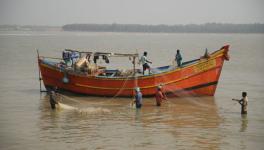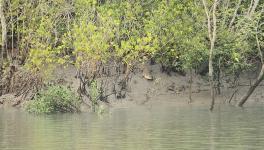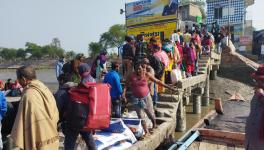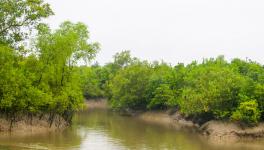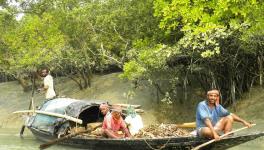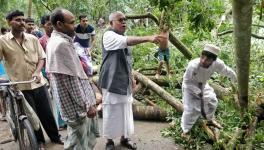Bengal: Local Mafia Turning Arable Land Into ‘Bheris’ is Creating Ecological Disaster in Sandeshkhali Area
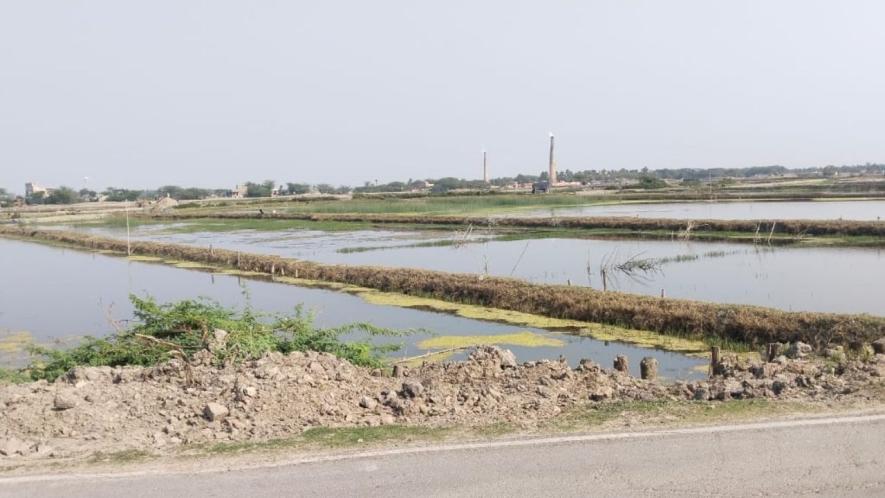
Kolkata: Shouvik Sau, 32, a farmer who lives in Sandeshkhali Kacharipara area, and his mother were entirely dependent on their land for sustenance. His arable 1.5 bigha land used to yield about 90 sacks of paddy. “Things changed when a few years ago, a local satrap of the ruling party, Shibu Hazra, ordered us to give our land for making a saltwater pond (bheri) as part of his ambitious project to make a Vannamei (a kind of shrimp) cultivation bheri in the Kacharipara area.
“They paid us only Rs 6,000 as the annual lease amount per bigha, which translates into Rs 500 a month for the fertile land that they forcibly took from us. Even this lease amount was kept pending for me and other farmers in the region. Whenever we went to the leader to get the lease amount, we were threatened. Thank God, I am not married. They would have even taken away my wife,” Sau told NewsClick.
Narrating his woes, he further said: “Apart from my arable land, there was a freshwater pond of nearly one bigha nearby and a fruit garden that had mango, litchi and other trees. After they took over our arable land and inundated them with salt water from the local river, all the vegetation in the pond as well as the mango and other fruit-bearing trees died slowly. Even the birds that used to frequent my house, as it was near the garden and the pond, abandoned my house. The entire area is now bare. Our whole mohalla (neighbourhood) is experiencing similar problems.”
Sau said after the recent protest by the people of Sandeshkhali, reclaiming land has started but it seems to be a tenuous exercise, as the land-demarcating marks are now under knee-deep water. “We are waiting for the monsoon season to wash out the salt water, so that in the next season, the land becomes arable. Experts have told us that it will take many years for the land to become arable again,” he added.
Sau said in the bheris, they (the local mafia) had cultivated Vannemei prawns, which are alien invasive species to Asia. These prawns have taken over all the freshwater fish. Also, this prawn species is also susceptible to various diseases.
“They (local mafia) are now saying that they do not earn any profit and cannot pay any lease amount. To sum it up, we are facing livelihood loss this year, and God knows for how many more year”,he added.
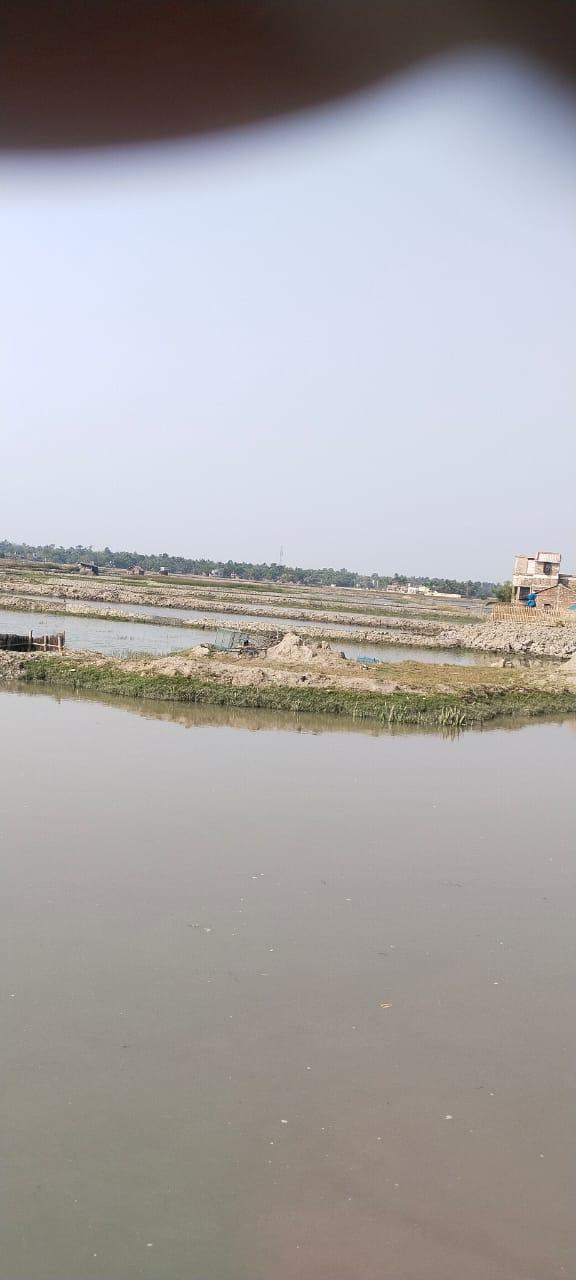
The situation of Prasanta Das, 48, who has three mouths to feed, is more pathetic. His home at Kacharipara was surrounded by three bighas of fertile land whose patta (land rights) he had got during the land reforms ushered in by the erstwhile Left Front government. This land was his sole source of income and consumption of rice for his family. He said he used to cultivate the Gitanjali variety of paddy in his fields and twice a year would get full yield.
He told NewsClick that this piece of land had been forcibly taken over by the same land mafia, led by Shibu Hazra. He was told to keep his mouth shut in the face of veiled threats to harm his family. Now, saline water has wreaked havoc on his land, too and a tubewell near his house is also contaminated with saline water. A deep tubewell about 1 km from his house is the only drinking water source for the household. Dasi said he too has not been paid the promised Rs 6,000 lease amount from the present bheri owner. Reclaiming the land is now impossible for this small farmer.
Naba Dutta, a well-known environmentalist and secretary of Sabuj Bachao Manch ( Save Green Forum ) told Newsclick that this was the situation not only in Sandeshkhali, but everywhere in South Bengal’s North and South 24 Parganas districts.
Acres and acres of land is submerged in saline water, suitable for Vannamei cultivation, in major areas of the state, such as Sandeshkhali 1 and 2, Bhangore, Shashon, Haroa, Minakha, Bashirhaat and Sonarpur. As a result, the top soil is getting eroded, which takes at least 50 years for its formation.
The entire ecological system is at risk due to this, says Dutta, adding that from birds to big trees and even coconut trees are dying in the region and the area is becoming.
Reclaiming the land is an impossible task, as a section of the administration is also hand-in-glove with the local mafia and is giving “a safe passage” to them, as they enjoy close proximity with the ruling party,” Dutta alleged.
NewsClick also spoke to leading science activist Sourav Chakraborty, assistant general secretary of the Paschim Banga Vigyan Manch (PBVM). He said his organisation had studied the root of this problem.
It is not an economic question but a law and order question, as most of those who had taken this land on lease are big capital mafia, he said.
Earlier, every bheri in the state used to be administered through cooperatives, but now that system has been destroyed. After a disaster struck in Vannemei cultivation when a disease made it impossible to culture the shrimps, most of the acquired land was left barren. The original land owners are now moving to other states, especially to Kerala and Tamil Nadu, as migrant labourers.
“This is a man-made ecological disaster, with the entire ecology and humans deeply affected,” he said.
“We have been able to interfere in some cases, but many cases remain unsolved. We are also starting an awareness campaign in the affected blocks of North and South 24 Parganas, asking people not to give away arable land for making bheris. We have also arranged meetings between those affected after forming of bheris and those who were contemplating to give up their land to make bheris,” he added.
“Even to create these bheris, a lot of mangroves are being cut in the fringe areas of Sundarbans on a large scale. We are planting thousands of mangroves saplings on behalf of PBVM to make up for this loss. We are also advising people to reclaim their land by using the salinity tolerant variety of indigenous paddy. There is groundwater depletion and salinity influx in drinking water sources of the areas where these bheris have been formed,” said Chakraborty.
Debasish Barman of Sundarbans fishermen community and president of All India Fishers and Fisheries Workers' Federation, told NewsClick that the problem was recreation of topsoil in areas where the bheris had been forcibly made, creating a grave ecological problem.
“Our organisation is against usurping arable land and turning those into bheris resulting in crop and vegetation loss in the area. As a resident of Hingalgunj, where, too, thousands of acres have been converted to bheris, the ramification of this is known to me,” he added.
Barman said: “Tillers are at first becoming fishery workers in their own land and then, when they are not gaining income from the operations, they are migrating to other states in search of work.”
He further said that “signs of an ecological disaster can be seen everywhere. The toxic water of shrimp cultivation is contaminating the ground water resources of the area, tubewells are not working, and those that do, the water does not pass the quality tests”.
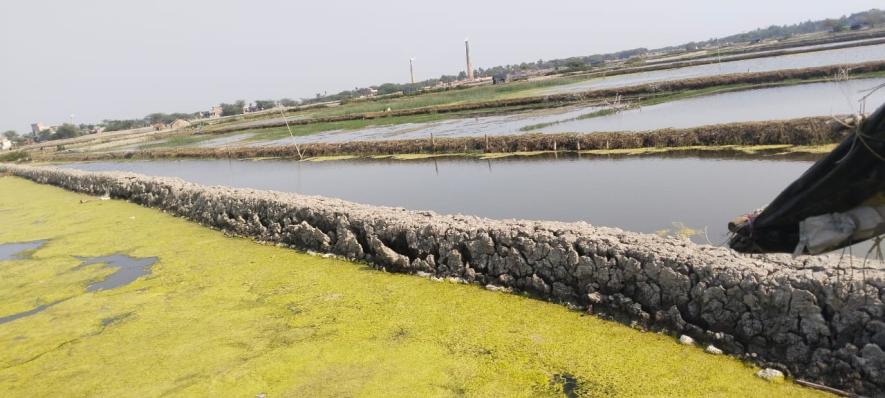
It may be recalled that Prabhat Mishra, secretary, department of agriculture, West Bengal, had flagged concerns over increasing salinity levels in the Sundarbans due to heavy siltation, which was obstructing the flow of fresh water and disrupting the salinity balance.
"Our department has been working on an ingenious project of excavating 654 km of creeks -- which has allowed an influx of fresh water, reducing salinity and transforming farming practices. The excavation of creeks had also allowed an influx of fresh water, replacing toxic Vannamei shrimp cultivation with freshwater Tiger prawns, a local species. This transformation has resulted in the rejuvenation of the Sundarbans, promoting biodiversity and sustaining livelihoods, irrigation and waterways," he said recently.
A vast population worldwide live on deltas, and in sprawling mega cities, such as Kolkata, Shanghai, Dhaka and Bangkok. Conservative estimates value major deltas worldwide at trillions of dollars in economic revenue and ecosystem services. The rich delta ecosystem and its services — storm protection, nutrient and pollution removal and carbon storage — are being destroyed.
P. vannemei is highly susceptible to various shrimp diseases and are carriers of TSV, WSSV, YHV, IHHNV and LOVV.P. monodonis refractory to TSV and IHHNV, as per scientists. Vannamei and P.stylirostris shrimp species are alien to Asia and their import may lead to import of new viruses and contamination of local shrimp stocks, say experts.
Get the latest reports & analysis with people's perspective on Protests, movements & deep analytical videos, discussions of the current affairs in your Telegram app. Subscribe to NewsClick's Telegram channel & get Real-Time updates on stories, as they get published on our website.












